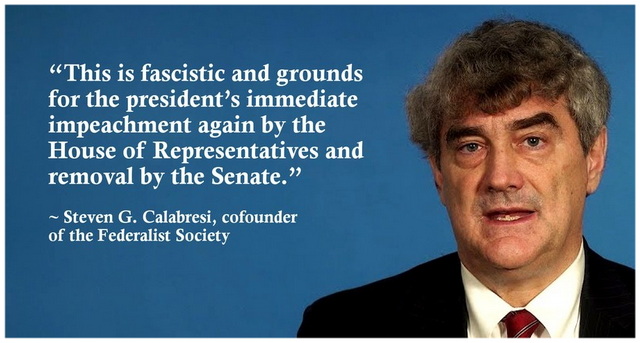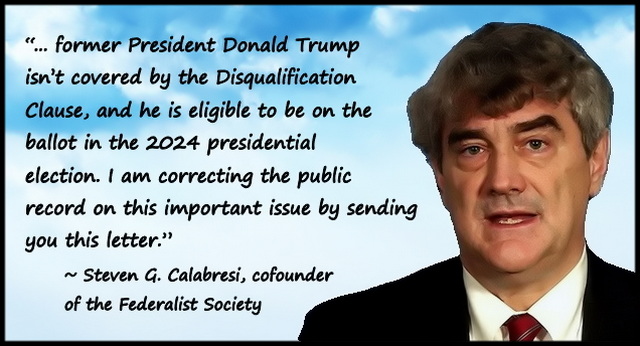This is a large “Sploosh” as a Part Three to the question of Trump’s ability to be on the ballot for the 2024 election. In my Part Two dated Sept 7th, based on a great couple readings that: “I see nothing in the 14th Amendment including the President or Vice President in the outcome. In fact, I see language excluding them.” (Also Part One is worth reading through as well.)
The guy who popularized the article noted by the #NeverTrumpers and the Left is the co-founder of The Federalist Society, Steven Calabresi. And when he came out in support of by a couple Federalist legal scholars [as well as some Leftist scholars], the Left and said #NeverTrumpers were quick to memorialize it:
THE NATIONAL PULSE nails it with this link fested post!
Steven Calabresi – the law professor who co-founded the conservative Federalist Society legal organization – has conceded that Section 3 of the 14th Amendment does not in fact bar former President Donald Trump from the presidential ballot, despite claiming in a much-hyped op-ed from August that this was the case.
The Northwestern University law professor had been an outspoken proponent of the legal theory that Trump was barred from running for office on the grounds that he incited an insurrection on January 6th, 2021 – in violation of a Civil War era constitutional provision. It’s an initially floated by law professors William Baude and Michael Stokes Paulsen, with Calabresi quickly popularizing it.
[….]
The three men were originally in agreement that “an officer of the United States” included individuals elected as either President or Vice-President. However, Calabresi now says he believes that the President and Vice-President are not, due to “a technicality in the drafting of the disqualification clause of Section 3 of the 14th Amendment”, “officers” – that term being reserved for positions appointed by the President, rather than the President himself.
Additionally he concedes the events of January 6th do not constitute an ‘insurrection’. Calabresi credits former U.S. Attorney General Michael Mukasey with changing his mind.
New Hampshire Secretary of State David Scanlan has already rejected calls to disqualify Trump, via the 14th Amendment, from the state’s ballot.
The VOLOKH CONSPIRACY notes the change of mind: “Calabresi now agrees with Tillman that the President is not an “Officer of the United States.” And YAHOO NEWS also notes that last week professor Calabresi made an about-face
- In a letter to The Wall Street Journal, he said he had been persuaded by an opinion article in that newspaper that the provision — Section 3 of the 14th Amendment — did not apply to Trump.
So I wanted to help out the #NeverTrumpers and pre-empt their correcting themselves:
Here is the WALL STREET JOURNAL “quick clip” by Professor Calabresi:
Former U.S. Attorney General Michael Mukasey’s op-ed “Was Trump ‘an Officer of the United States’?” (Sept. 8) has caused me to change my mind about an argument that I have had with Prof. Seth Barrett Tillman for 25 years. Mr. Mukasey is right: Looked at in the context of the Disqualification Clause of the 14th Amendment, the president is neither an “officer of the United States,” nor, obviously, a “member of Congress.” That must be why the Constitution prescribes a separate oath for the president.
As a result, former President Donald Trump isn’t covered by the Disqualification Clause, and he is eligible to be on the ballot in the 2024 presidential election. I am correcting the public record on this important issue by sending you this letter.
Prof. Steven G. Calabresi
Northwestern Law School
VOLOKH continues:
- Last week, former Attorney General Michael Mukasey wrote an op-ed in the Wall Street Journal. He contended that the President is not an “Officer of the United States.” Many of Mukasey’s arguments track a 2021 article that Seth and I wrote in the NYU Journal of Law & Liberty. Long-time readers may remember that Tillman persuaded Mukasey on this issue back in 2015. (This issue also came up with the Mar-A-Lago raid.)
Here is key point from that WALL STREET JOURNAL article:
Was Trump ‘an Officer of the United States’?
A careful look at the 14th Amendment’s Insurrection Clause shows that it doesn’t apply to him.
….A good deal of attention has focused thus far on whether the attack on the Capitol on Jan. 6, 2021, was an “insurrection or rebellion” and, if so, whether Mr. Trump “engaged” in it. Those questions, however, need not be answered until two preliminary questions of law are addressed: Is the presidency an “office . . . under the United States,” and was the presidential oath Mr. Trump swore on Jan. 20, 2016, to support the Constitution taken “as an officer of the United States”?
The latter question is easier. The use of the term “officer of the United States” in other constitutional provisions shows that it refers only to appointed officials, not to elected ones. In U.S. v. Mouat (1888), the Supreme Court ruled that “unless a person in the service of the government . . . holds his place by virtue of an appointment . . ., he is not, strictly speaking, an officer of the United States.” Chief Justice John Roberts reiterated the point in Free Enterprise Fund v. Public Company Accounting Oversight Board (2010): “The people do not vote for the ‘Officers of the United States.’ ”
Article VI of the Constitution provides that senators and representatives “and all executive and judicial Officers . . . of the United States” take an oath to support the Constitution. But the presidential oath is separately provided for at the end of Article II, Section 1, which would be superfluous if the president’s oath were required by the general language in Article VI. Mr. Trump took an oath as president pursuant to Article II, not as an officer pursuant to Article VI. Because the Insurrection Clause applies only to those who have taken an oath “as an officer of the United States,” he can’t be barred by that clause from serving in any capacity.
As for the former question, the language disqualifying a rebel from holding “any office . . . under the United States” follows the language disqualifying the rebel from office as “Senator or Representative in Congress, or elector of President and Vice President.” If “any office . . . under the United States” is broad enough to cover the president, it is certainly broad enough to cover senators, representatives and perhaps electors. Such a reading would make reference to those specific offices superfluous.
[….]
As for the former question, the language disqualifying a rebel from holding “any office . . . under the United States” follows the language disqualifying the rebel from office as “Senator or Representative in Congress, or elector of President and Vice President.” If “any office . . . under the United States” is broad enough to cover the president, it is certainly broad enough to cover senators, representatives and perhaps electors. Such a reading would make reference to those specific offices superfluous.
Is it plausible that the authors of the 14th Amendment specified senators, representatives and electors but meant to include the presidency and vice presidency under the general term “any office . . . under the United States”? Note that the term is “any office,” not “any other office,” which implies that the positions listed before it aren’t “offices under the United States,” because they are elected not appointed.
But that conclusion is uncertain. The phrase “office under the United States” appears four other times in the body of the Constitution, at least two of which—one barring officeholders from accepting a foreign title or emolument, and one barring anyone impeached and convicted from holding such an office—may well apply to an elected official, including the president. Also, if a holder of an “office under the United States” meant the same thing as “Officer of the United States,” why weren’t the same words used to specify it?
That may be puzzling, but as applied to Mr. Trump it is irrelevant, because—again—he didn’t take and thus didn’t violate an oath as an “Officer of the United States,” and so cannot be barred by the 14th Amendment from seeking re-election.
Even a criminal conviction wouldn’t bar him from seeking and winning the presidency. The Constitution specifies only that a person seeking that office be at least 35, a natural-born citizen and a 14-year U.S. resident. If Mr. Trump is to be kept from office, it will have to be done the old-fashioned way, the way it was done in 2020—by defeating him in an election.
Mr. Mukasey served as U.S. attorney general, 2007-09, and as a U.S. district judge, 1988-2006.

